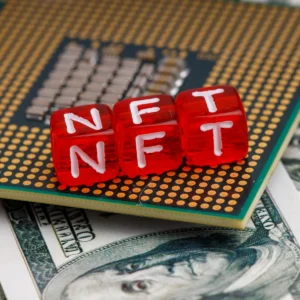Business
NFTs and money laundering: is your organization in danger?

Published
3 years agoon

What is an NFT?
An NFT is a crypto asset. Cryptoassets are defined by the Economical Perform Authority (FCA), for anti-money laundering (AML) purposes, as ‘cryptographically attached electronic representation of the value of contractual rights that works on the type of distributed ledger engineering and could be transferred, saved or traded digitally. ‘
A crypto asset is an electronic asset that uses community ledgers online to prove ownership. An excellent example of a community ledger would be the blockchain, which will produce and examine and secure transactions. NFTs are unique non-fungible tokens that can not be replaced by something different, unlike Bitcoin, a form of cryptocurrency. Non-fungible suggests that it is fantastic. NFT’s occur on the blockchain and maintain a distinctive electronic signature, like a certification of credibility, that can not be duplicated. They’re ‘tokenized. ‘An excellent example of an NFT could be electronic art or music.
There are three types of crypto assets, and a technical assessment of the kind you maintain is necessary to determine when it is a regulated or unregulated entity. Where your organization is controlled, it will soon be caught by the provisions of The Income Laundering, Terrorist Financing and Move of Funds (Information on the Payer) Regulations 2017 (the Regulations). Breach of the Regulations is a criminal offense.

The regulation of crypto-assets (including NFTs) from an AML perspective
The Income Laundering and Terrorist Financing (Amendment) Regulations 2019 influence nearly all the legislative changes needed by the American Union’s Fifth Anti-Money Laundering Directive. The 2019 Regulations modify the 2017 Regulations to cover companies that provide companies of exchange and custody of crypto assets. Companies that option in the transfer or storage of crypto assets must be aware of their obligations under the Regulations and related legislation and their duty to apply to the FCA for registration and supervision.
The Regulations specify that controlled companies should create and keep regulations and procedures to mitigate the danger of money laundering and enemy financing. Whether money laundering has occurred or not, you and your organization could be sanctioned for failing to have adequate procedures.
You and your organization must know the kind of crypto assets being dealt with and contemplate if they’re often controlled or unregulated, relying on nature. If you’re uncertain, make sure you seek suggestions, as the ramifications could result in a criminal offense being committed.
Additionally, it is worth noting that whether your organization is controlled or perhaps not, failing to effectively recognize the kind of crypto asset and dealing with them without adequate regulation reveals your organization generally to money laundering risk.
NFTs and the lacuna in the AML legislation
Although many NFTs belong to being unregulated, that’s not always the situation, and some may be controlled and included in the Regulations. NFTs are cryptographic, meaning they use electronic encoding and decoding of information. But, they’re non-fungible and unique. This means an NFT may belong to one of the controlled recognition types and may thus be regulated.
Perhaps the NFT falls to the Regulations, or maybe not is all dependent on the particular features, and you should seek guidance to identify the kind of NFT you’re dealing with. In the lack of specific recognition, it could be wise to check out the heart of the Regulations to steer clear of the risk of doing a criminal offense.
What’re the dangers related to?
To get an NFT, consumers desire an electronic crypto budget to store their cryptocurrency. A crypto budget could be an application that allows people of cryptocurrency to store and retrieve their electronic resources in the electronic world. Similar to the idea of Apple Spend on your cellular phone. NFT consumers can then join their budget to the marketplace they approach to purchase their NFT. NFTs are often offered via an auction site. But, a few internet sites enable you to get NFTs immediately.
There are many money laundering dangers associated with the obtain of NFT, which could make you and your organization prone:
- They’re volatile. NFTs may have considerable value, and this means they’re increasingly used as a way to launder money.
- They may be transferred from an electronic budget to some other in moments. This causes it to be difficult for law enforcement to recapture criminal resources and money as it can instantly move around the electronic world.
- Significant sums of money could be transferred anonymously from one electronic budget to another. It’s feasible for criminals to fully cover up their identities through the money laundering “process” by utilizing a Bitcoin budget that doesn’t involve verification.
Many crypto exchange programs are unregulated; thus, they might not adhere to the Know-Your-Customer (KYC) and other recognition recommendations, which vary the principal Regulations. But, it should be noted that crypto transactions that may exist in the UK have registration involved with the FCA and should comply with the Regulations.
Realization
It’s an easy task to become misled by the terminology found in the scope of NFT but being unaware of your business’s obligations in the electronic sphere will not afford you a defense if you breach the Regulations. You and your organization may face the same sanctions if you don’t get all the sensible steps and workout all proper due homework when working with NFTs. Your business should fulfill its obligations under the Regulations if your organization is the controlled sector. This can include:
- Make sure your organization bears out regular risk assessments
- that you’ve policies and procedures in place to mitigate the dangers of money laundering
- that you carry out powerful due homework on your entire customers
- and that you keep records of the customer due assignment undertaken together with any transactional history.
If your organization is perhaps not caught by the rules, just how your organization handles crypto assets, particularly NFTs, should be cautiously considered. Working with a potentially unregulated entity and perhaps not carrying out the correct checks could keep your organization prone to being a mechanism for crime, which could then cause you and your organization to be involved in the commission of a criminal offense.
Shoosmiths have a dedicated Economic Offense team that could carry out an in-depth report on your organization to recommend if you’re caught by the regulations discussed in that article. The group provides suggestions about AML and other crime compliance policies and procedures and has specialist knowledge of crypto assets. If your organization offers the transfer or storage of crypto assets, our Economic Offense team may inform you through the procedure to make sure you have systems set up to safeguard you and your organization from money laundering to ensure that you don’t commit a criminal offense.
Related Posts:
Hi, my name is Nebojša, and I've been involved in digital marketing for over 15 years. I've written for various websites, covering a wide range of topics. I'm particularly interested in subjects like technology, gaming, app development, and I also have a passion for automobiles. Additionally, I work on SEO optimization. In my free time, I enjoy reading, walking, traveling and spending time with my wife and daughter.

You may like
Business
How to Cut Costs on Shipping to Amazon Warehouses – 2025 Update
Published
2 weeks agoon
June 16, 2025
Shipping products to Amazon FBA warehouses is a major expense for third-party sellers. Whether you’re shipping a single box via SPD (Small Parcel Delivery) or pallet loads through LTL/FTL (Less Than Truckload/Full Truckload), shipping costs can eat up 15% to 40% of your total margin if not carefully optimized.
In 2025, with higher fuel surcharges, regional delivery bottlenecks, and Amazon’s stricter FBA receiving policies, cutting shipping costs is no longer optional—it’s a necessity for profitability.
Checklist for Cutting Amazon FBA Shipping Costs
| Action | Benefit |
| Use Partnered Carriers | Save 30–70% on SPD/LTL rates |
| Consolidate into LTL when possible | Reduce per-unit cost and handling fees |
| Ship from prep centers near FCs | Shorten the last-mile distance |
| Use standard box/pallet dimensions | Avoid oversized penalties |
| Automate with FBA software tools | Reduce labor cost, avoid prep errors |
1. Choose the Right Shipping Method: SPD vs. LTL/FTL
Many sellers default to SPD because it’s familiar and easier to set up. But as your shipment volume grows, this method quickly becomes inefficient. If you’re sending multiple boxes regularly, switching to LTL or FTL can significantly lower your per-unit cost.
LTL is ideal for 1–4 pallets, while FTL becomes more economical once you’re shipping 20+ pallets. The larger and more frequent your shipments, the more you save through freight consolidation and pallet optimization.
| Shipping Method | Best For | Typical Volume | Cost Efficiency |
| SPD (Small Parcel) | Low-volume shipments (<150 lbs per box) | Under 10 boxes | Low to Moderate |
| LTL (Less Than Truckload) | Medium-volume shipments | 1–4 pallets | High for consolidated loads |
| FTL (Full Truckload) | Large shipments to one FC | 20+ pallets | Very high if volume allows |
Always run a side-by-side cost analysis between Amazon’s partnered LTL and SPD options for the same shipment. Even at lower volumes, LTL can beat SPD in cost-per-unit when handled correctly.
2. Optimize Box and Pallet Dimensions

Smartly stacked boxes and pallets in Amazon warehouses highlight how optimizing dimensions helps maximize space utilization
Dimensional weight pricing has become the standard for carriers, meaning your shipping bill depends as much on volume as on actual weight. Oversized packaging, under-filled boxes, or poorly stacked pallets all translate into wasted money.
Even minor changes to your box dimensions can cut down on shipping charges significantly. It’s especially important to standardize carton sizes across SKUs and ensure you’re getting the most efficient stackability when using LTL or FTL.
| Packaging Type | Cost Impact | Optimization Tip |
| Oversized Boxes | Higher per-unit cost + surcharges | Split items into smaller boxes |
| Inconsistent Sizes | Inefficient pallet use | Use standard cartons |
| Poor Pallet Stacking | May result in Amazon rejections | Follow Amazon’s FBA pallet guidelines |
A Freightos shipping case study found that by trimming box height by just 2 inches across 300 monthly units, one seller saved $420 in dimensional weight charges over 30 days.
3. Consolidate Shipments Strategically
Frequent small shipments often result in higher per-unit shipping costs, more carrier pickups, and a higher likelihood of fulfillment center delays. Consolidating multiple small shipments into a single, well-organized load saves on handling and often qualifies for better freight rates.
More importantly, Amazon prefers well-labeled, bulk deliveries over fragmented ones, which can
delay check-ins during peak seasons.
| Scenario | Estimated Monthly Shipping Cost | With Consolidation |
| 4 SPD shipments × 10 boxes | $900 | $540 |
| 1 LTL pallet shipment (same qty) | — | $480 |
If you’re using a prep center or 3PL, schedule shipments biweekly or monthly instead of weekly. Many centers will hold goods for a few extra days to help you consolidate at no added cost.
4. Use a Prep Center Near Amazon FCs

A prep center near Amazon warehouses ensures faster and more accurate processing of shipments ready for dispatch
Shipping across the country adds avoidable costs, especially if your inventory is already located closer to Amazon’s main fulfillment hubs, according to Dollan Prep Center. Working with a prep center within a short distance of Amazon’s major FCs helps you reduce last-mile freight charges, shorten delivery windows, and reduce potential delays during appointment scheduling.
This also increases the chances of faster check-ins and fewer rescheduling penalties.
| Top FC Regions | Benefits of Nearby Prep Centers |
| Dallas/Fort Worth, TX | Central location, multiple nearby Amazon FCs |
| Hebron, KY | Common FBA inbound point for East Coast sellers |
| Moreno Valley, CA | Ideal for West Coast imports from Asia |
| Allentown, PA | High Amazon FC density, fast East Coast distribution |
Relocating your prep and storage from the West Coast to Kentucky or Ohio can reduce per-pallet shipping costs by 20–30%, especially for sellers distributing nationwide.
5. Leverage Amazon’s Partnered Carrier Program
Amazon offers discounted rates through its partnered carrier program, which includes both UPS for SPD shipments and several freight providers for LTL and FTL loads. These discounts are only available if you create shipments directly through Seller Central and use Amazon’s pre-approved carriers.
In most cases, Amazon’s partnered rates beat outside quotes, even those from negotiated commercial accounts.
| Service | Estimated Discount |
| Partnered SPD (UPS) | 30%–50% |
| Partnered LTL (XPO, CEVA, etc.) | 40%–70% |
While you must comply with Amazon’s strict packaging and labeling requirements to access these rates, the savings are substantial, l—especially for high-volume sellers or those regularly shipping to distant FCs.
6. Reduce Rejected Shipments with Better Labeling and Packing

Neatly stacked boxes in Amazon warehouses demonstrate strategies to reduce rejected shipments and improve delivery efficiency
FBA rejections are costly and often entirely avoidable. If your shipment arrives with incorrect labels, mixed SKUs, damaged boxes, or non-standard pallets, Amazon may either reject the shipment or charge you additional fees for correction.
These mistakes lead to delays, inventory miscounts, and wasted freight costs. Proper prep practices—including double-checking barcode placements and securely packing all cartons—go a long way in avoiding financial hits.
| Mistake | Possible Charge |
| Wrong label placement | $0.20–$0.30 per unit |
| Unscannable barcode | $0.15–$0.40 per unit |
| Rejected pallet | Full reshipment cost |
Based on Amazon seller reports, approximately 1 in 5 shipments that result in receiving delays are traced back to labeling or prep errors, ot transport problems.
7. Compare 3PL and Freight Forwarder Rates
Freight pricing varies widely depending on your route, volume, and carrier network. Many sellers overlook potential savings by sticking with default options like Amazon Partnered LTL when they could secure lower rates via third-party logistics (3PL) providers or freight brokers.
For international shipments, especially from Asia, consider FBA-friendly freight forwarders who understand Amazon labeling and delivery protocols.
| Shipping Scenario | Amazon Partnered Rate | 3PL Broker Rate | Savings Potential |
| 3 pallets to California FC | $620 | $520 | ~$100 (16%) |
| Full container from China | $2,400 | $1,800 | ~$600 (25%) |
Always confirm that your 3PL or freight broker can handle Amazon’s strict delivery appointments and ASN documentation. Mishandled deliveries can delay check-in by days or even weeks.
8. Use Software to Automate and Optimize Shipping
Managing logistics manually might work at a small scale, but as your operation grows, automation is critical. FBA-compatible software can help you generate labels, track freight costs, schedule restocks, and reduce prep errors.
Most tools also offer data dashboards that allow you to compare historical shipping costs and identify which products are the most expensive to move.
| Tool | Functionality |
| InventoryLab | Shipment creation, cost tracking, and label printing |
| RestockPro | Restocking suggestions and forecasting |
| ShipStation | Multi-carrier shipping rate comparisons |
| Sellerboard | Profit analysis, including logistics cost modeling |
Automating shipment creation and integrating freight cost visibility into your inventory management can help reduce administrative time by 20–30% and prevent avoidable prep center errors.
9. Negotiate Better Terms with Your Prep or Freight Providers
Shipping costs are not always fixed. If you’re consistently sending volume to FBA, you have leverage. Many prep centers, LTL brokers, and freight forwarders offer volume discounts, flat fees per pallet, or reduced storage costs if you ask.
Review your past 3–6 months of shipping data, calculate your average pallet count, and initiate a negotiation with your vendors.
Tip: Sellers averaging 10+ pallets per month can often secure flat monthly pallet rates, discounted receiving, or free shrink-wrapping—terms that reduce your cost per unit long term.
10. Eliminate Dead Weight: Audit Unprofitable Shipments

A focus on eliminating dead weight in Amazon warehouses leads to lighter, more cost-effective shipments
Not every product is worth shipping. It’s easy to fall into the trap of sending every piece of inventory to FBA, regardless of sales velocity or margin. Always review your SKU profitability before creating a shipment.
If a product yields less than $5 net profit after shipping and FBA fees, it may not be worth warehousing, especially if it ties up cash flow or increases long-term storage fees.
Sellers who regularly audit their shipping loads and purge underperforming inventory can reduce overall FBA shipping costs by 15–25%, according to Helium 10 seller data from Q4 2024.
Conclusion
Shipping costs are one of the easiest areas to improve once you understand the variables that impact pricing, from carton sizes to shipping method selection, from software automation to vendor negotiation.
In 2025, sellers who optimize these components can see thousands in annual savings and increase their margins without selling a single extra unit. Whether you’re operating at 500 units per month or 50,000, controlling your logistics pipeline will separate your business from competitors who let costs run unchecked.
Business
Post-Purchase Customer Experience – Why It’s the Key to Retention and Loyalty
Published
5 months agoon
February 6, 2025
In today’s fiercely competitive marketplace, securing a sale is just the beginning of the customer journey, not the end. Post-purchase customer experience has emerged as a pivotal aspect of not only retaining clients but also building unwavering loyalty.
Once the transaction is completed, a new chapter unfolds—one that can either transform a one-time buyer into a lifelong advocate or reduce them to just another statistic in the sea of disengaged consumers. Every interaction a customer has after the purchase, from personalized follow-ups to seamless customer support, plays a crucial role in shaping their perception of your brand.
As the dust settles on their initial decision to buy, it’s the ongoing experiences that will ultimately determine whether they return for more or drift away into the clutches of competitors. Understanding and optimizing this journey is not merely an option anymore; it’s a necessity for businesses striving to cultivate lasting relationships in a world where choices abound.
The Path to Loyalty: How Post-Purchase Experience Shapes Customer Relationships

Source: reverselogix.com
The journey to fostering customer loyalty begins long after the initial purchase is made; it is intricately woven into the fabric of the post-purchase experience. Picture this: a customer who eagerly anticipates their delivery, receiving a thoughtful follow-up email that not only confirms shipment but also includes tips for maximizing the product’s use—this simple gesture cultivates a sense of connection.
Afterward, a timely survey asking for feedback demonstrates that their voice matters, transforming a transactional relationship into a dialogue. Each element, from personalized recommendations based on their purchase history to dedicated customer support, deepens trust and enhances the emotional bond.
In this ever-competitive landscape, understanding that retention hinges not on the initial sale, but on the entire journey afterwards, can unlock the secret to creating lifelong advocates for your brand.
Beyond the Sale: The Critical Role of Aftercare in Customer Retention

Source: globalresponse.com
In the whirlwind of commerce, where transactions often take center stage, one critical aspect frequently slips through the cracks: aftercare. This pivotal phase begins the moment a customer clicks “confirm” on their order, extending well beyond the point of sale.
It’s not merely a follow-up; it’s a commitment to nurturing the relationship, a chance to reinforce the connection established during their buying journey. Think of aftercare as the secret sauce of customer loyalty—personalized messages, helpful tips, and timely support can transform an ordinary experience into an extraordinary one.
Customers who feel valued and supported are more likely to return, not just for the products they cherish but for the community and service that accompany them. In a landscape flooded with choices, businesses that prioritize aftercare don’t just sell products; they cultivate loyalty, turning one-time buyers into lifelong advocates.
Conclusion

Source: youngurbanproject.com
In conclusion, the post-purchase customer experience is a critical pillar in fostering retention and loyalty among consumers. By understanding and enhancing this stage of the customer journey, businesses can build lasting relationships that go beyond a single transaction.
Effective post-purchase marketing not only reinforces the value of the initial purchase but also encourages repeat business through personalized communication and ongoing engagement. As companies strive to differentiate themselves in a competitive landscape, prioritizing the post-purchase experience will prove essential in transforming customers into brand advocates, ultimately driving sustainable growth and long-term success.
Business
From Trader to Business Owner – How to Build Your Own Trading Firm
Published
6 months agoon
January 3, 2025
Transitioning from a trader to a business owner is a thrilling journey, a leap from the exhilarating chaos of the markets into the strategic realm of entrepreneurship. Many traders, fueled by their passion for the financial world, dream of establishing their trading firm—a bold move that promises both independence and potential prosperity.
Yet, this path is strewn with challenges, requiring not just deep market knowledge but also formidable skills in management, finance, and strategic planning. How do you go from analyzing charts and executing trades to overseeing a team of traders and making critical business decisions? In this article, we’ll explore the multifaceted process of building your trading firm, offering insights on everything from legal considerations to cultivating a strong company culture.
Prepare to navigate the nuances of this transition—where the fierce nature of trading meets the intricate art of business ownership. Your journey begins now.
Identifying Your Niche in the Trading Market

Source: udemy.com
Identifying your niche in the trading market is an essential first step on your journey from trader to business owner. Start by reflecting on what truly captivates you—whether it’s forex, stocks, options, or commodities—and the unique strategies you’ve developed through experience.
Tools like depth of market software can play a pivotal role during this process, offering detailed insights into market trends and liquidity levels, which can help you pinpoint areas of opportunity. Dive deep into market trends, analyzing which segments show potential for growth and profitability, while also considering the competition.
Don’t shy away from experimenting; this phase often involves trial and error, as you test different trading styles against varying market conditions. Additionally, leverage your existing knowledge to carve out a specialized area, perhaps focusing on a demographic or asset class that isn’t saturated.
Ultimately, the key lies in blending your passion with market demands, creating a distinctive offering that speaks to both your interests and the needs of prospective clients.
Creating a Business Plan for Your Trading Firm

Source: www.getwork.co.uk
Creating a business plan for your trading firm is not merely a formality; it’s the foundation upon which your entrepreneurial dreams will stand. Begin by defining your vision—what kind of trading strategies will you employ? Will you focus on equity markets, forex, or perhaps cryptocurrencies? This clarity will inform every aspect of your plan, from your target market to your operational framework. Next, conduct a thorough market analysis to identify your competitors and potential clients, ensuring your unique selling proposition shines brightly amidst the noise.
Financial projections are crucial; outline your startup costs, expected revenues, and break-even analysis to illustrate the viability of your venture. Don’t forget to address risk management—how will you safeguard your capital against market volatility? Each section of your plan should weave together, showcasing not only your ambitions but also a pragmatic approach to navigating the complexities of the trading landscape.
This document is your blueprint for success; invest the time to make it comprehensive and compelling.
Legal Considerations for Starting a Trading Firm

Source: luxalgo.com
Establishing a trading firm entails navigating a labyrinth of legal considerations, intricately woven into the fabric of financial regulations. Aspiring business owners must first determine the appropriate business structure—whether a sole proprietorship, partnership, or corporation—each carrying its legal ramifications and tax obligations.
Securing the necessary licenses and permits is paramount; depending on your trading strategies and the markets you operate in, you may need to register with regulatory bodies like the SEC or FINRA. Additionally, compliance with anti-money laundering laws and data protection regulations will shape operational protocols, safeguarding both your firm and clientele. As you forge ahead, consulting with legal professionals proficient in financial regulations is not just wise—it’s essential, ensuring that your firm not only thrives but does so within the bounds of the law, avoiding the perilous pitfalls that could threaten your entrepreneurial dreams.
Conclusion
In conclusion, transitioning from a trader to a business owner by establishing your trading firm is an exciting yet challenging journey that requires careful planning, strategic decision-making, and an adept understanding of market dynamics. By leveraging essential resources, including cutting-edge tools like depth-of-market software, you can enhance your trading strategies and gain valuable insights into market trends.
Building a successful trading firm involves not only honing your trading skills but also developing a solid business framework, fostering a collaborative environment, and staying agile in a rapidly evolving marketplace. With the right approach and commitment to continuous learning, the path from trader to business owner can lead to remarkable growth and fulfillment in the world of finance.

Best Restaurants in Munich to Impress Clients During a Business Dinner

How to Cut Costs on Shipping to Amazon Warehouses – 2025 Update

Is Singapore Real Estate Market a Goldmine for Investors in 2025?

EU takes steps to legislate sustainable fashion. It will work.

Game On: North Texas is a ‘Technology Entertainment Concept ‘Paradise.

Cannondale Information: All-new Topstone Carbon gravel bicycle unveiled.
Trending
-

 Fashion3 years ago
Fashion3 years agoEU takes steps to legislate sustainable fashion. It will work.
-

 Entertainment3 years ago
Entertainment3 years agoGame On: North Texas is a ‘Technology Entertainment Concept ‘Paradise.
-

 Sports3 years ago
Sports3 years agoCannondale Information: All-new Topstone Carbon gravel bicycle unveiled.
-

 Business3 years ago
Business3 years agoThe Defence industry supports hundreds of UK jobs and business.
-

 Business3 years ago
Business3 years agoCustomer Experience Innovation: The New Battlefield For Businesses.
-

 Business3 years ago
Business3 years agoA Guide To Anti-Money Laundering For Your Business.
-

 Fashion3 years ago
Fashion3 years agoDubai Design District welcomes leading Polish designers to the world-class fashion community.
-

 Business3 years ago
Business3 years agoApple Plans To Double Its Digital Advertising Business Workforce.